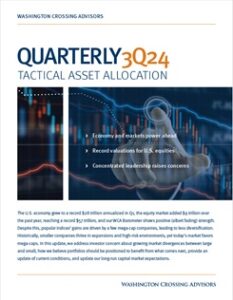Emerging Opportunity?
Roughly 160 of the world’s nearly 200 countries are considered emerging markets (EM), and approximately 6 billion people, or 85% of the world’s population, live in emerging economies (map, below). Thus, there are plenty of reasons not to ignore emerging markets in a portfolio. But there are special considerations unique to emerging markets. These include currency movements, different political and legal systems, greater exposure to commodity prices in some cases, and periodic debt troubles. However, none of this is new, and many emerging markets are evolving from immature, rapid growth toward more mature, slower growth. Even though growth may be slowing in the EM and unique risks exist, we should still consider EM opportunities because these markets appear to offer better value than developed markets (DM) now and because emerging markets appear well-positioned to capitalize on a rebounding global economy post-COVID-19.
Emerging Markets
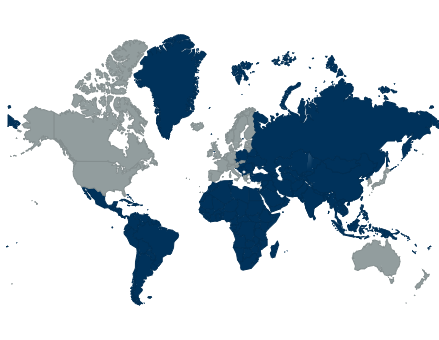
Developed = Grey
Converging Growth
It is crucial to understand that the EM, while still growing faster than the developed world, is no longer growing as it once did. The chart below shows how EM is converging toward lower DM growth rates (Chart A, below). The largest two contributors to the EM downshift are productivity and labor. According to the Conference Board, EM productivity growth fell to -0.5% in 2019 from 1.5% average growth between 2000-2007. At the same time, labor growth slowed to 0.3% in 2019 from 0.8% in 2000-2007. Taken together, slower growth in productivity and labor is bringing EM growth rates closer to those of mature economies.
Chart A
Growth Trends Converge
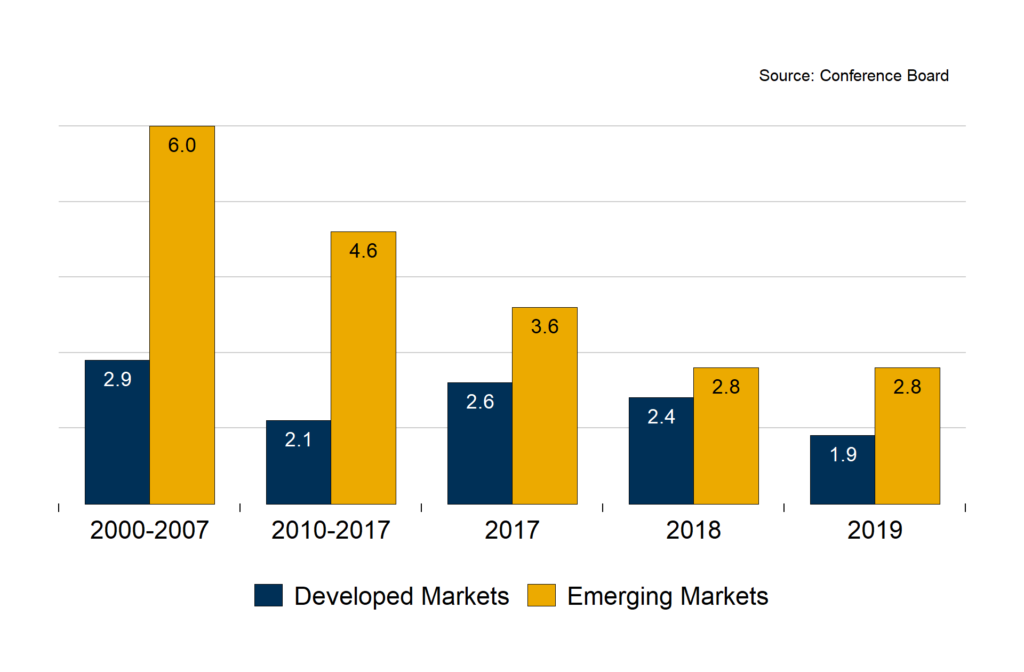
Better Value?
Even though EM growth may be slowing, we should consider EM opportunities because they seem to offer better value. To see why, we can look at the total value of a market’s stocks, plus net debt, versus sales. This ratio is called an “enterprise value to sales” (EV/Sales) ratio. It is a broad measure of value that considers both creditor and equity owner interests as providers of capital.
The US stock market has had an EV/Sales ratio between 1.5-3X for most of the past 25 years. Today the S&P 500, proxy for the US stock market, trades near the top end of that range. By contrast, the emerging market EV/Sales ratio ranged between 1-2.5x for the past 25 years. Today, the EV/Sales ratio for the EM is near 2x, easily inside the historical range (Chart B, below). All else equal, a better starting valuation is positive for future returns.
Chart B
Comparing Valuations (EM vs. Domestic Stocks)
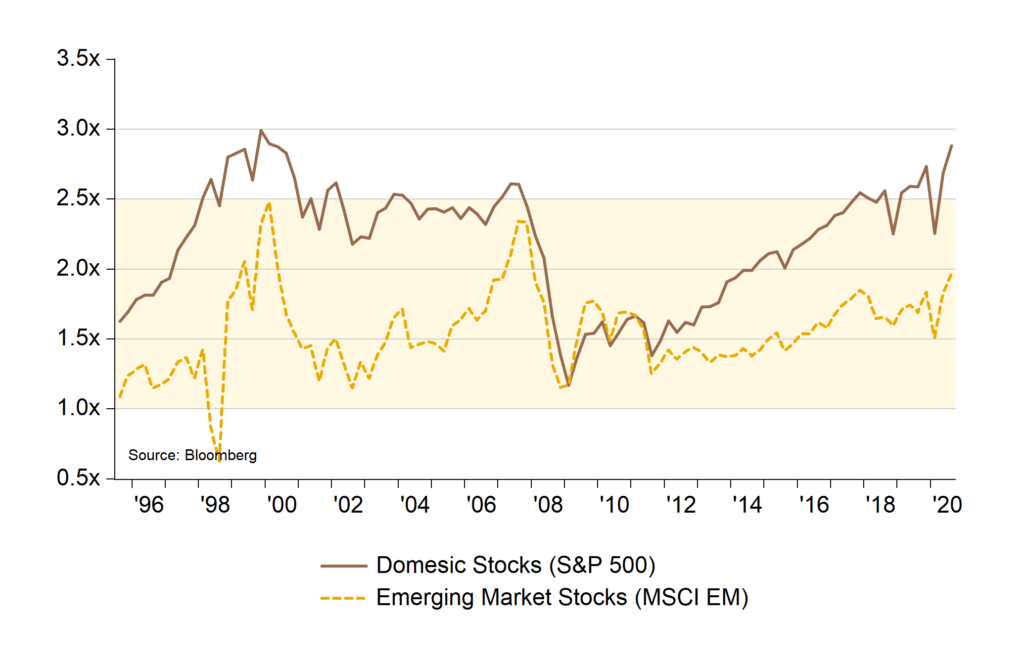
Positioned for Growth Rebound
Emerging markets are far more sensitive to upturns in the global business cycle. The greater sensitivity is because a large share of EM economies is based on producing goods and raw materials. By contrast, developed economies tend to focus on less cyclical services. When global surveys of manufacturing activity turn down or up, EM stocks tend to respond. If the worldwide outlook for growth continues to make progress and COVID-19 worries begin to fade, growth should pick up, providing a powerful tailwind for emerging markets. Our analysis of incoming data suggests that growth continues to improve based on the most recent update of our WCA Barometer (Chart C, below).
Chart C
WCA Conditions Barometer
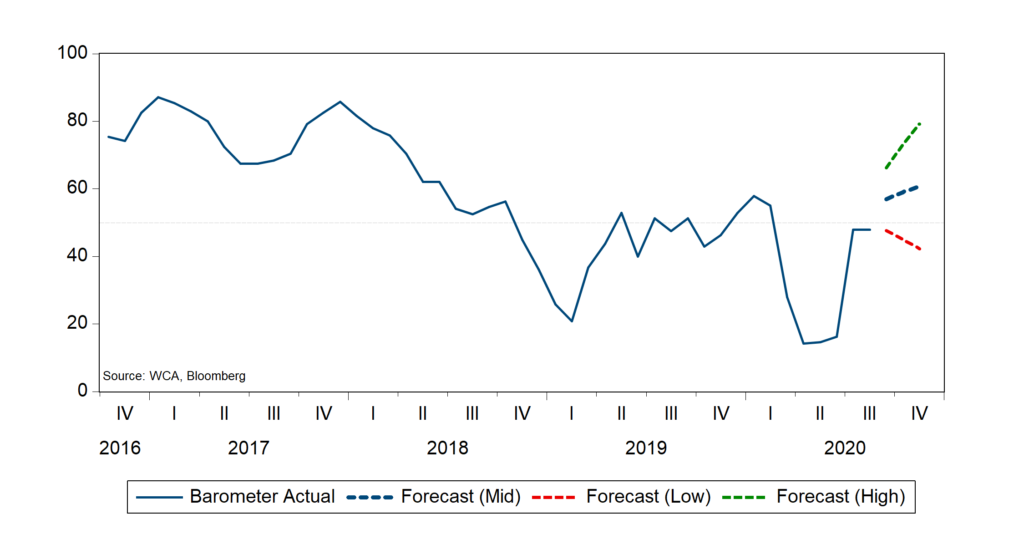
While we cannot know with certainty how the next few months will pan out, existing data point patterns to continued recovery. It is also worth noting that EM versus DM equity markets’ relative performance is starting to show signs of lift (Chart D, below).
Chart D
Emerging vs. Developed Market Relative Performance
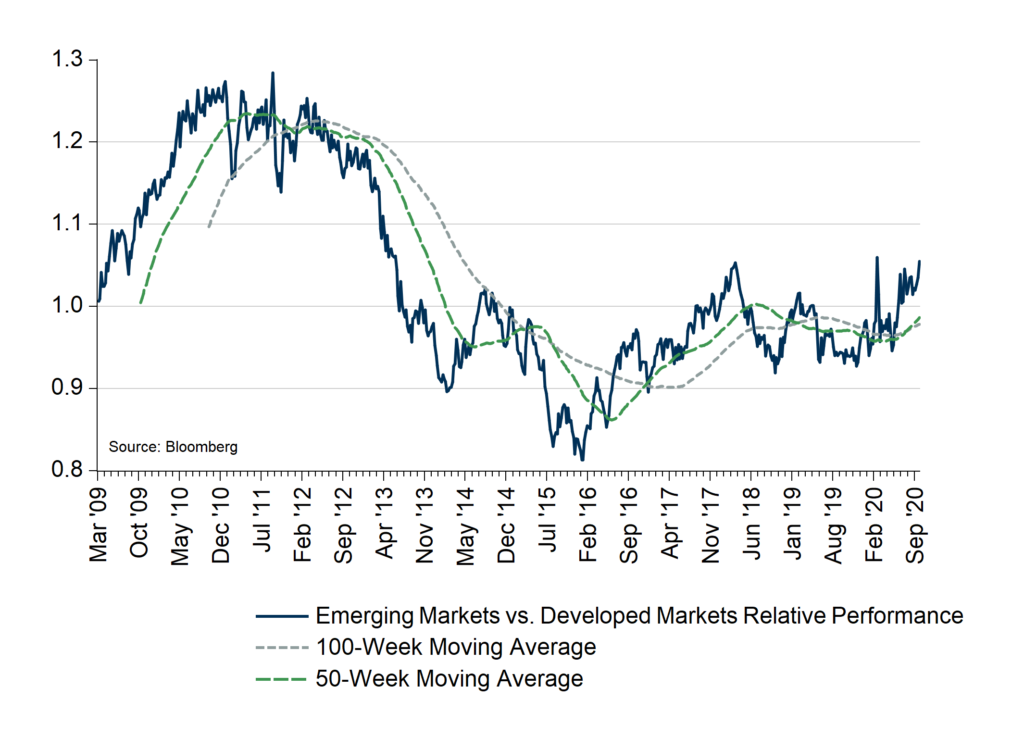
Conclusion
So although growth rates between emerging and developing economies seem to be converging, we should position portfolios for better emerging market performance for two main reasons now. First, emerging markets appear to offer better relative value than developed markets. Most importantly, EM is well-positioned to benefit if global growth continues to pick up, especially if COVID-19 worries fade.
Could the case for emerging markets come undone? Of course, it could. Yet, the stars appear to be aligning for potential outperformance in the months ahead. We will continue to track and challenge our key assumptions underlying our bullish tactical case for EM. But so long as we continue to see progress in critical areas of the global economy, the case for EM is likely to remain intact.
Disclosures:
The Washington Crossing Advisors’ High Quality Index and Low Quality Index are objective, quantitative measures designed to identify quality in the top 1,000 U.S. companies. Ranked by fundamental factors, WCA grades companies from “A” (top quintile) to “F” (bottom quintile). Factors include debt relative to equity, asset profitability, and consistency in performance. Companies with lower debt, higher profitability, and greater consistency earn higher grades. These indices are reconstituted annually and rebalanced daily. For informational purposes only, and WCA Quality Grade indices do not reflect the performance of any WCA investment strategy.
Standard & Poor’s 500 Index (S&P 500) is a capitalization-weighted index that is generally considered representative of the U.S. large capitalization market.
The S&P 500 Equal Weight Index is the equal-weight version of the widely regarded Standard & Poor’s 500 Index, which is generally considered representative of the U.S. large capitalization market. The index has the same constituents as the capitalization-weighted S&P 500, but each company in the index is allocated a fixed weight of 0.20% at each quarterly rebalancing.
The information contained herein has been prepared from sources believed to be reliable but is not guaranteed by us and is not a complete summary or statement of all available data, nor is it considered an offer to buy or sell any securities referred to herein. Opinions expressed are subject to change without notice and do not take into account the particular investment objectives, financial situation, or needs of individual investors. There is no guarantee that the figures or opinions forecast in this report will be realized or achieved. Employees of Stifel, Nicolaus & Company, Incorporated or its affiliates may, at times, release written or oral commentary, technical analysis, or trading strategies that differ from the opinions expressed within. Past performance is no guarantee of future results. Indices are unmanaged, and you cannot invest directly in an index.
Asset allocation and diversification do not ensure a profit and may not protect against loss. There are special considerations associated with international investing, including the risk of currency fluctuations and political and economic events. Changes in market conditions or a company’s financial condition may impact a company’s ability to continue to pay dividends, and companies may also choose to discontinue dividend payments. Investing in emerging markets may involve greater risk and volatility than investing in more developed countries. Due to their narrow focus, sector-based investments typically exhibit greater volatility. Small-company stocks are typically more volatile and carry additional risks since smaller companies generally are not as well established as larger companies. Property values can fall due to environmental, economic, or other reasons, and changes in interest rates can negatively impact the performance of real estate companies. When investing in bonds, it is important to note that as interest rates rise, bond prices will fall. High-yield bonds have greater credit risk than higher-quality bonds. Bond laddering does not assure a profit or protect against loss in a declining market. The risk of loss in trading commodities and futures can be substantial. You should therefore carefully consider whether such trading is suitable for you in light of your financial condition. The high degree of leverage that is often obtainable in commodity trading can work against you as well as for you. The use of leverage can lead to large losses as well as gains. Changes in market conditions or a company’s financial condition may impact a company’s ability to continue to pay dividends, and companies may also choose to discontinue dividend payments.
All investments involve risk, including loss of principal, and there is no guarantee that investment objectives will be met. It is important to review your investment objectives, risk tolerance, and liquidity needs before choosing an investment style or manager. Equity investments are subject generally to market, market sector, market liquidity, issuer, and investment style risks, among other factors to varying degrees. Fixed Income investments are subject to market, market liquidity, issuer, investment style, interest rate, credit quality, and call risks, among other factors to varying degrees.
This commentary often expresses opinions about the direction of market, investment sector, and other trends. The opinions should not be considered predictions of future results. The information contained in this report is based on sources believed to be reliable, but is not guaranteed and not necessarily complete.
The securities discussed in this material were selected due to recent changes in the strategies. This selection criterion is not based on any measurement of performance of the underlying security.
Washington Crossing Advisors, LLC is a wholly-owned subsidiary and affiliated SEC Registered Investment Adviser of Stifel Financial Corp (NYSE: SF). Registration with the SEC implies no level of sophistication in investment management.

